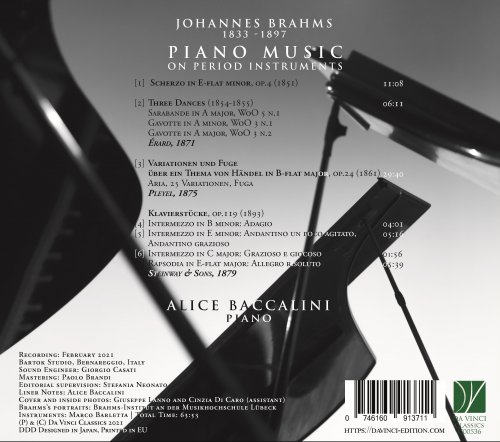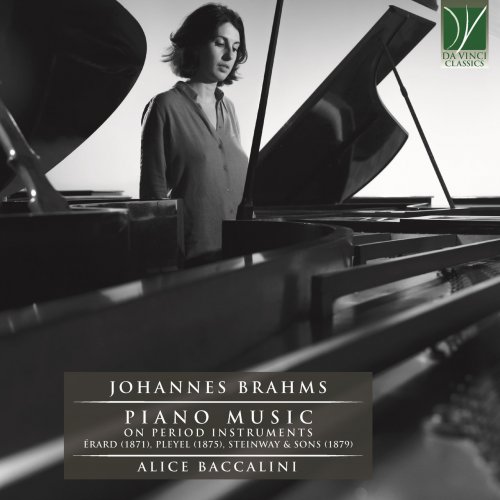
Alice Baccalini - Johannes Brahms: Piano Music on Period Instruments (Érard 1871, Pleyel 1875, Steinway & So (2022)
BAND/ARTIST: Alice Baccalini
- Title: Johannes Brahms: Piano Music on Period Instruments (Érard 1871, Pleyel 1875, Steinway & So
- Year Of Release: 2022
- Label: Da Vinci Classics
- Genre: Classical
- Quality: FLAC (tracks)
- Total Time: 63:54 min
- Total Size: 203 MB
- WebSite: Album Preview

Tracklist:
01. Scherzo in E:Flat Minor, Op. 4 (Played on Erard built in 1871)
02. Sarabande in A Minor, WoO 5 - Gavotte in A Minor, WoO 3 No. 1 - Gavotte in A Major, WoO 3 No. 2 (Played on Erard built in 1871)
03. Variationen und Fuge über ein Thema von Händel in B:Flat Major, Op. 24 (Played on Pleyel built in 1875)
04. 4 Klavierstücke, Op. 119: No. 1 in B Minor, Intermezzo. Adagio (Played on Steinway & Sons built in 1879)
05. 4 Klavierstücke, Op. 119: No. 2 in E Minor, Intermezzo. Andantino un poco agitato (Played on Steinway & Sons built in 1879)
06. 4 Klavierstücke, Op. 119: No. 3 in C Major, Intermezzo. Grazioso e giocoso (Played on Steinway & Sons built in 1879)
07. 4 Klavierstücke, Op. 119: No. 4 in E:Flat Major, Rhapsody. Allegro risoluto (Played on Steinway & Sons built in 1879)
Four pieces, four very diverse genres, three pianos. Just as in a prism, the image of an elusive composer such as Brahms is brought to converge. Starting with a Scherzo, reaching the youthful Dances, getting to one of the most elaborated cycles of the nineteenth-century variation form, until the last collection, closing a piano catalogue among the most arduous and indecipherable of… Well, when one gets here, things become hard. Of Romanticism? Of late Romanticism? Or of modernity?
This is the strange fate of this great composer and book collector. He was so silent and so little inclined to intimacy, that he prompted entire genealogies of composers, critics and historians to try and enroll him in their ranks: from Hanslick to Schoenberg, from Nietzsche to Mahler.
Loving what is unexpressed is certainly not the simple praise of obscurity or of a character’s severity, although these were very strong elements in Brahms’ personality. The unexpressed is the fact that often, when facing his scores, the interference of diverse elements (which, though hinged on a peerless harmonic fantasy, seem to move by themselves) creates islands of tension. They let themselves never be resolved, just as happens with his diabolic taste for rhythmical intersections, or with his ease in finding very powerful melodic forms, digging into the listener’s memory. Therefore, even the Scherzo form is divided into (at least) six sections, whilst the Sonata surrounding it probably disappears. The Variation form hybridizes itself with the Fugue. Modality intersects with tonal language in the Rhapsody which closes the composer’s relationship with solo piano, in a very intimate – and therefore wordless – journal. Wordless, or perhaps with the only words of an ironic apostle of Romanticism, who was paradoxically closer to the generation before him (Schumann) and to that after him (Mahler).
This is the strange fate of this great composer and book collector. He was so silent and so little inclined to intimacy, that he prompted entire genealogies of composers, critics and historians to try and enroll him in their ranks: from Hanslick to Schoenberg, from Nietzsche to Mahler.
Loving what is unexpressed is certainly not the simple praise of obscurity or of a character’s severity, although these were very strong elements in Brahms’ personality. The unexpressed is the fact that often, when facing his scores, the interference of diverse elements (which, though hinged on a peerless harmonic fantasy, seem to move by themselves) creates islands of tension. They let themselves never be resolved, just as happens with his diabolic taste for rhythmical intersections, or with his ease in finding very powerful melodic forms, digging into the listener’s memory. Therefore, even the Scherzo form is divided into (at least) six sections, whilst the Sonata surrounding it probably disappears. The Variation form hybridizes itself with the Fugue. Modality intersects with tonal language in the Rhapsody which closes the composer’s relationship with solo piano, in a very intimate – and therefore wordless – journal. Wordless, or perhaps with the only words of an ironic apostle of Romanticism, who was paradoxically closer to the generation before him (Schumann) and to that after him (Mahler).
Year 2022 | Classical | FLAC / APE
As a ISRA.CLOUD's PREMIUM member you will have the following benefits:
- Unlimited high speed downloads
- Download directly without waiting time
- Unlimited parallel downloads
- Support for download accelerators
- No advertising
- Resume broken downloads


